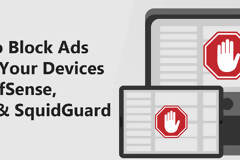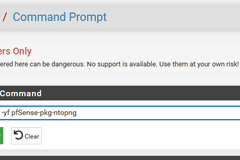Squid Guard Regex Kullanım Örnekleri
Using Expressionlists in SquidGuard
You will never be able to add a possible "bad" pages to your domains
and urls files. To achieve additional blocking expressionlists can be
used.
In an expressionlist you enter words that are mostly likely part of
unwanted domains and urls. Each domains and url will be matched against
the entries found in the configured expression lists.
Attention: Only use expressionlists if you are sure you do not block
away innocent sites. Additionally keep in mind that using these lists
can result in a noticable performance impact.
1. Adding expression lists to the configuration
Expression lists are included in the dest tag. The example below
shows the relevant part of the squidGuard configuration file:
Using expression lists to block porn
dest porn {
domainlist porn/domains
urllist porn/urls
expressionlist porn/expressions
}
You can add an expression list to each defined destination if you
find this necessary (reminder: performance!). SquidGuard expects
the expression file relative to the defined dbhome just as the
domains and urls files.
2. Syntax of expression lists
The expressionlist file format is lines with regular expressions as
described in regex(5). Of most interrest is:
. Matches any single character (use "." to match a ".").
[abc] Matches one of the characters ("[abc]" matches a single "a" or
"b" or "c").
[c-g] Matches one of the characters in the range ("[c-g]" matches a
single "c" or "d" or "e" or "f" or "g".
"[a-z0-9]" matches any single letter or digit.
"[-/.:?]" matches any single "-" or "/" or "." or ":" or "?".).
? None or one of the preceding ("words?" will match "word" and "words".
"[abc]?" matches a single "a" or "b" or "c" or nothing (i.e. "")).
* None or more of the preceding ("words*" will match "word", "words"
and "wordsssssss". ".*" will match anything including nothing).
+ One or more of the preceding ("xxx+" will match a sequence of 3 or
more "x").
(expr1|expr2) One of the expressions, which in turn may contain a
similar construction ("(foo|bar)" will match "foo" or "bar".
"(foo|bar)? will match "foo" or "bar" or nothing (i.e. "")).
$ The end of the line ("(foo|bar)$" will match "foo" or "bar"only at
the end of a line).
x Disable the special meaning of x where x is one of the special regex
characters ".?*+()^$[]{}" ("." will match a single ".", "\" a
single "" etc.)
The entries to the expression lists are cleartext. Thus a start to
block possible sexual material by expression match could look like:
(^|[-?+=/_])(bondage|boobs?|busty?|hardcore|porno?|sex|xxx+)([-?+=/_]|$)
If everything is set up to your liking make the changes active by
issuing the command:
squid -k reconfigure
3. Some notes and hints
+ Unless you build your expressions very very carefully there is
a high risk you will have annoyed users on your neck.
Typically you might accidentally block "Essex", "Sussex",
"breastcancer", "www.x.org" etc. in your eagerness for
blocking pornographic material. In practice you would probably
replace some of the words in the example above with some more
clearly pornographic related words that I don't find
appropriate to list here.
+ While the size of the domain and urllists only has marginal
influence on the performance, too many large or complex
expressions will quickly degrade the performance of
squidGuard. Though it may depend heavily on the performance of
the regex library you link with.
+ There is a set of sample files for a group of supposedly
pornographic sites under samples/dest/adult in the source tree
that you can use as a start if porn blocking is one of your
tasks. Please note: These lists are very, very old and not
intended for production systems. Use them to test your
squidGuard. For an initial setup the lists will work, but we
recommend that you review these lists before using them. Those
domains and urls have been collected automagically by a robot.
No manual evaluation of the corresponding contents has been
performed. Therefor there is a chance some nonpornographic
sites have sliped in.
+ To avoid publishing to your users a complete guide to banned
sites, you probably want to have some or all of these files
protected by for instance:
chmod 640 /wherever/filter/db/dest/adult/*
chown cache_effective_user /wherever/filter/db/dest/
adult/*
chgrp cache_effective_group /wherever/filter/db/dest
/adult/*
where cache_effective_user and cache_effective_group are the
values for the corresponding tags as defined in squid.conf.
Google Maps'i Engellemek
Regex
Engellenen Urller
https://www.google.com.tr/maps/@41.0220591,28.6359552,15z
https://www.google.pl/maps/@41.0220591,28.6359552,15z?entry=ttu&g_ep=EgoyMDI1MDQxMy4wIKXMDSoASAFQAw%3D%3D
Crx Uzantılı Dosya indirilmesini Engellemek
Regex
Regex Çalışabileceğiniz Adres
Kaynaklar



























